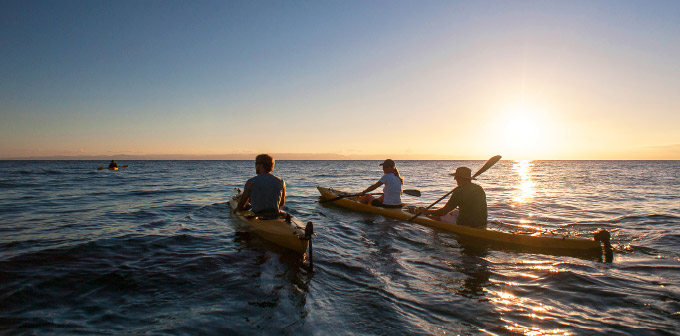
Read the original article here: http://www.ecolodges.com/interviews/masoala-forest-lodge/
Pierre, can you first introduce yourself and tell us a little about how you ended up working in the hospitality industry.
My name is Pierre Bester. I was born in South Africa and became hooked on the outdoor life from an early age. While studying law at the University of Cape Town, I joined a local surf life-saving club and began my life-long passion with the sea. In 1990, after completing my studies, I put my career in law on hold and went traveling.
It was while hanging out and doing some rafting with a local operator in Cusco, Peru, that I first had thoughts of pursuing a career in adventure tourism. After swallowing a lot of Urubamba River water on an exploratory rafting trip, I turned yellow. A diagnosis of hepatitis forced a change of my travel plans, and I ended up back home in South Africa to convalesce.
While wandering weakly around at an outdoor show in Johannesburg, wondering what to do next, I ‘discovered’ a Klepper expedition sea kayak exhibit. Other than the surf-ski kayaks used by the surf lifesavers, sea kayaking was unknown at that time in South Africa and this sea kayak was a revelation to me and was the start of my eco-tourism journey.
One thing led to another, and in 1993 I migrated to Lake Malawi in Eastern Africa in an old Land Rover with a pod of 5 Klepper kayaks and some tents. Here I established the first commercial sea kayaking operation in Africa, based on Mumbo and Domwe Islands of the Lake Malawi National Park, and aptly named it “Kayak Africa”.
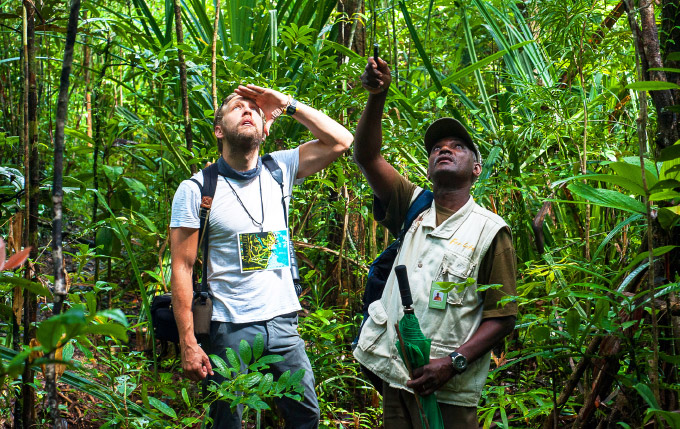
You now run the Masoala Forest Lodge. How did you get from “Kayak Africa” on Lake Malawi to the Masoala peninsula in Madagascar?
While developing these islands in Lake Malawi into luxury eco-lodges, I continued my explorations by sea kayak of Southern Africa and the islands of the eastern Indian Ocean. I pioneered the first commercial sea kayaking expeditions in Malawi, Mozambique, Zanzibar and finally in 1998, the Masoala Peninsula of northeast Madagascar.
Blown away by the pristine natural beauty of Masoala, where the rainforest meets the tropical sea, I realized that my long search for paradise was over. I embarked on the mission to set up another eco-lodge operation on the Masoala Peninsula, culminating in an epic sea journey from Mozambique to Masoala by single engine open motorboat and the formation of the Malagasy company, Kayak Masoala, in 2002 and the opening of the Masoala Forest Lodge in 2004.
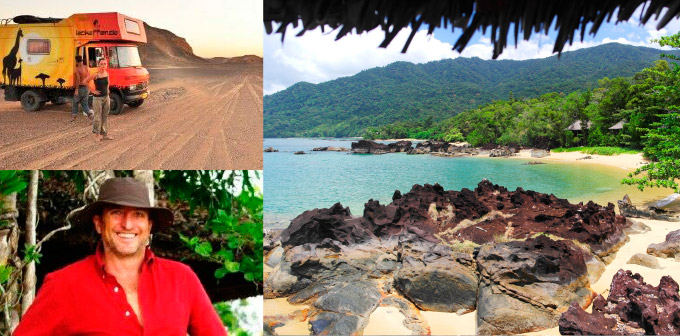
In 2010 my wife to be, Maria, completed another epic journey – an eleven-month drive from her home in Germany to Cape Town in a 1973 Mercedes ice cream van – 23 countries and 30,000 km. At her last stop-over before returning home, we met. One month later we were in Madagascar with Maria helping run the lodge and guiding the sea kayak expeditions. As an adventurous nature lover and born hostess, Maria was quickly at home and found herself loving the work. We now move between our homes on the Masoala and in Cape Town with our two children.
Your Masoala Forest Lodge has now been open for more than a dozen years. What are the demographics of your visitors?
The basic breakdown is Swiss 40%, German 20%, UK 20%, and USA 20%. The guests are usually couples, ranging in age from 30 – 80 years, interested in wildlife and culture, and the desire for an active but comfortable and authentic experience.
You say that your guests want to be actively engaged during their vacation. What types of activities are based out of your lodge?
Only non-motorized activities are promoted by the lodge. Our clients are encouraged to walk in the Primary Forest of the Masoala National Park, and always with our official guides. Other walks are in the coastal forest trails along the seashore and the trail network in the private reserve of the lodge.
We also provide snorkeling gear and training, along with directions to the best coral reefs right off the beach, and sea kayaking gear and guiding is also available to our clients who are encouraged to undertake at least one outing along the sheltered coast.
A pirogue (traditional dug-out canoe) trip up the Tampolo River forms a part of the standard itinerary, and an evening sailing pirogue trip on the sea is a popular optional activity.
Boat fishing is offered as an extra activity, but it is only for game fish and only enough for consumption in the lodge. Catch and release sport fishing is not undertaken as it is contrary to local culture and is wasteful of fuel.
Whale watching by boat is likewise offered, but usually is restricted to the boat transfers to and from the city of Maroantsetra, and unnecessary boating around the bay is not encouraged. The boat skippers have been trained in whale watching techniques and of the Malagasy whale watching regulations.
In all of our activities, clients are encouraged to interact with their guides and learn something of the local culture and traditions as well as the natural history. We also provide a cultural tour of the village of Ambodiforaha and of a traditional local farming operation as part of our standard itinerary. For those who want to learn even more, a comprehensive library of natural history is available in the lodge.
I also see that you have a 10-day expedition that explores the Masoala Peninsula by sea kayak. Can you describe how that works? Do the guests come back to the main lodge each night?
We explore this natural paradise over 10 nights–kayaking the forested coastline and to deserted tropical islands, into pristine mangroves and shady rivers overhung by primary rainforest; snorkeling the coral reefs; swimming in warm tropical sea and crystal clear streams; beachcombing; and exploring the rainforest for the unique wildlife. Four nights are spent in the lodge and the other six nights in the two expedition camps on the peninsula.
Although I have yet to visit, I’ve always thought of Madagascar as a pristine island with very exotic wildlife. Are those assumptions true?
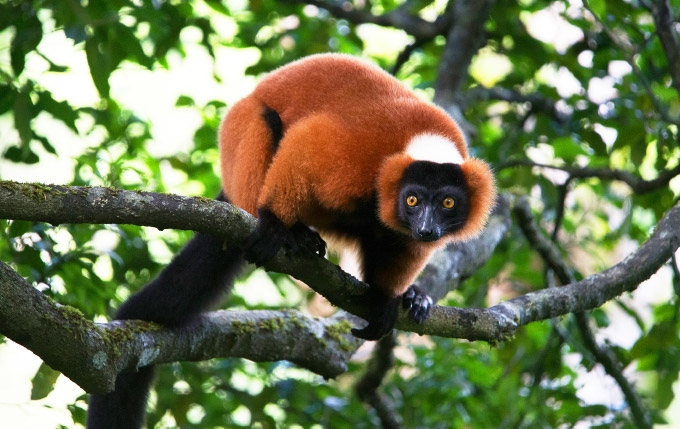
Apart from the natural beauty of the forest and beaches, the endemic wildlife of Masoala is one of the main drawing cards for tourists visiting the lodge. The country is famous for lemurs and Masoala has nine species. White-fronted brown and bamboo lemurs are commonly sighted in the coastal forest at the lodge by day and dwarf, mouse, woolly and sportive lemurs are regularly seen on night walks. The red-ruffed lemur, while normally seen in the primary rainforest has also been known to visit the lodge, as has the elusive aye-aye on several occasions.
Carnivores such as the fosa, Madagascar civet and the ring-tailed mongoose occur in the lodge area and several species of tenrec are regularly seen.
Reptiles abound, with the Madagascar day gecko, panther chameleon and tree boa being regularly seen around the lodge. The world’s smallest chameleon – the tiny stump-tailed chameleon, barely a few centimeters in size, and the enormous parson’s chameleon – the planet’s largest chameleon, are found in the primary forest.
The Masoala rainforest is also one of Madagascar’s best birding spots. Sightings of the scaly and short-legged ground-rollers are regular. Mixed species flocks can contain an incredible diversity of vangas with the helmet vanga being the star of this show, whilst the much scarcer bernier’s vanga is a possibility. Other desirable endemics for bird watchers include the brown mesite, Madagascar wood rail, rufous vanga and red-breasted coua. The very rare Madagascar serpent eagle was thought to be extinct until re-discovered at Masoala. Many of the more common Madagascar endemics, such as blue coua, Madagascar green pigeon, lesser and greater vasa parrot, France’s sparrow hawk and rainforest scops owl, can be regularly seen in the lodge grounds.
A huge diversity of life also dwells below the warm waters of the Bay d’Antongil. Snorkeling the reefs in front of the lodge will produce a colorful selection of hard and soft corals, reef fishes and other marine life. Resident green turtles and bottlenose dolphins are often seen from the shore or kayak. During the months of July until September the bay is a breeding ground for humpbacked whales which pass close by the lodge. Pelagic game fishes such as king mackerel, king fish, yellow-fin tuna and bonito abound and feature regularly on the lodge menu as does lobster, octopus and calamari.
The lodge is also home to many valuable timber trees, including ebony and rosewood, and rare palm species.
Ecolodges often work closely with local communities. Is that the case with the Masoala Forest Lodge? Can you provide some examples of how you are able to help the local people?
Only local Malagasy craftsmen and artisans were commissioned for the structural and interior elements of the lodge and other utilitarian objects in use in the lodge, showcasing the local craftsmanship and providing job creation.
The lodge serves as a gallery and a living cultural museum, where traditional artifacts and utilitarian objects are in daily use and on display, promoting a sharing of cultural information to the guests and a sense of celebration and ownership for the local community.
The staff of the lodge, totaling up to 17 men and women, is drawn from villages from the length of the Masoala peninsula. This includes cooks and kitchen staff, camp staff, builders, boat captain and crew, and official and kayak guides. Contract day labour is sourced from the local village of Ambodiforaha, approximately 2 kilometers from the lodge.
All the staff members have been trained by the management for their roles and are encouraged to train others to increase the pool of skilled labour. They are paid wages that are higher than the minimum wage and at a higher rate than paid by other tourism operators or other employment opportunities in the area. Other direct financial benefits include the tips and gifts from clients that are shared equally between all staff.
The local village of Ambodiforaha has a traditional women’s dance and song group that performs at the lodge for all our clients as part of the standard itinerary. We also work with local villagers to sell the excess fruit, vegetables, vanilla and cloves to the lodge. We pay a premium price for these spices and then resell them to our clients, in effect providing access to a far better paying market than the locals would otherwise have.
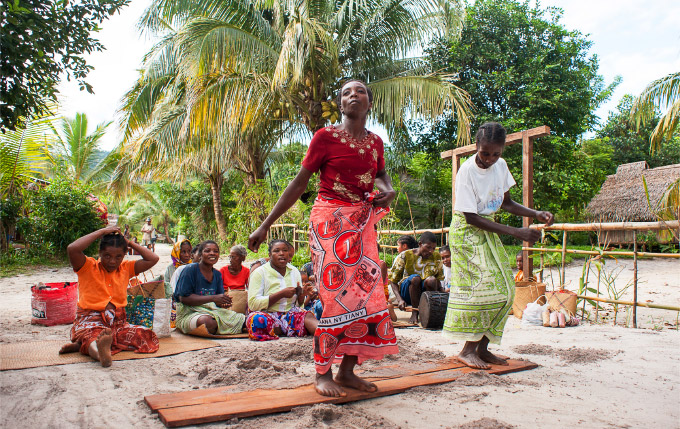
We also provide free boat transport to and from Maroantsetra for the people from the local villages. Travel expense is a major problem for the local communities as villagers would otherwise have to walk up to 15 kilometers to a bigger village, and then pay a relatively large amount for the boat from there to town, which would normally render the trip unviable.
We also have a long-term relationship with the school in Ambodiforaha and assist with the supply of teaching equipment and school uniforms for the children.
The lodge has financed and provided cement rubbish bins for the local villages of Ambodiforaha and Ville Masoala at Cap Masoala. These bins are used for the collection and disposal of non-biodegradable refuse by the villagers. The contents are regularly emptied by the lodge, and transported to Maroantsetra on our boats for disposal.
We also arrange and finance regular beach clean-ups by the local communities to keep the coast free of any plastic pollution. In many ways, the Masoala Forest Lodge is involved in a variety program of community benefits to assist the local village to live sustainably in this protected area.
Another common attribute of ecolodges is their focus on preserving the natural environment. Do you incorporate sustainability practices in your lodge to minimize your impact on the environment?
Maintaining a sustainable eco-tourism infrastructure within remote areas requires the use modern technologies while at the same time minimizing any negative impact on the environment. We use satellite Internet link-up and notebook computers for the vital email communications of our tourism operation. We also have mobile telephones, connected with a local local mobile network using a booster and antenna, to provide the voice communications vital for logistics.
An array of solar panels, battery bank and inverter provides the bulk of the electrical power used by the lodge. For rainy days and heavy load periods a silenced diesel stand-by generator is used to charge up the battery bank. Solar charged LED lamps are used for clients lighting needs. The kitchen and client’s bathrooms have gas powered heat-exchanger units to provide instant hot water.
To minimize our impact on the environment, we use plastic, leak proof, septic tanks for the sewerage treatment for all client and staff toilets to ensure no leaching of raw sewerage. Grey water is treated with grease traps and then into below ground soak-aways.
Water is pumped from a hand dug well, sited in the wetland above the mangrove river estuary, to a plastic header tank and then gravity fed by plastic piping to the lodge and infrastructure.
Cooking is done on gas hobs and wood-burning ovens that use dead wood collected from the lodge area. A three-stage ceramic filter is used for our clients drinking use. Vegetable storage is in a charcoal lined “fridge” to keep vegetables dry and well aired and free of insects.
Vegetable waste is collected in a scavenger proof container and then converted to compost and mixed with cow dung and straw from rice harvest to provide mulch and nutrient for the vegetable gardens and fruit trees.
The very limited plastic and paper waste generated by the lodge is carried to Maroantsetra on the lodge boats or burned in a scavenger proof pit at the lodge.
Do you have any plans for the future of the Masoala Forest Lodge?
The lodge is now at its desired level and size and we have no plans to change our main building, although we do have some other sites on the peninsula that we would like to develop with “villa” style accommodation for 2-4 people.
Is there anything else that we should know about the Masoala Forest Lodge?
Without doubt, we offer the best authentic experience of Madagascar. Enquire now for more information on our lodge and the activities we offer.
Read the original article here: http://www.ecolodges.com/interviews/masoala-forest-lodge/


